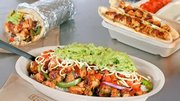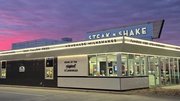Article
Surging off-premise orders call for more flexible restaurant planning
An increase in off-premise orders is reducing the footprint for some restaurants, resulting in smaller dining areas. That makes flexibility now 'king' for restaurants, according to Mark Rossi of Avanti Restaurant Solutions Inc.

June 27, 2019 by Elliot Maras — Editor, Kiosk Marketplace & Vending Times
With takeout, delivery and drive-thru orders on the rise, is your restaurant's kitchen positioned to meet the changing customer traffic flow?
Mark Rossi, founder and CEO of Avanti Restaurant Solutions Inc., a national kitchen design and equipment dealer to restaurant chains, has a first-hand view of the changes taking place in many restaurants. And while Rossi is the first to agree change is taking place, he readily admits there are no easy answers for restaurants that want to be responsive to all their customers.
"Are you ready for 50% of your business to leave the restaurant?" he asked, speaking on "innovations in foodservice equipment" during a session at the recent National Restaurant Show held at Chicago's McCormick Place. Joe Carbonara, editor in chief of Foodservice Equipment Supplies Magazine, served as panel moderator.
Rossi shared that he recently visited a sit-down restaurant and saw no one in the dining room. With only a slight exaggeration, he observed, "People don't want to eat in a restaurant anymore."
Off-premise business impacts dining area
Rossi affirmed the increase in off-premise orders is reducing the footprint for some restaurants, resulting in smaller dining areas. The kitchen, he said, needs to be more flexible since the staff now has to handle different types of orders as the amount of takeout and delivery business rises.
To this point, Carbonara noted he recently had to wait 45 minutes at a restaurant because the staff was giving priority to takeout orders.
Having the flexibility needed to meet both in-house and off-premise orders often requires a different equipment layout, he said.
"It's bringing everything to the heart of the operation and being flexible," he said. "Flexibility is king."
"Everything has got to move closer to the center (the kitchen) and you've got to be flexible," he said, noting Chipotle Mexican Grill has done a good job in this area.
New equipment requires training
Newer equipment, such as combination ovens, are more versatile, Rossi said, but require additional training. Combination ovens can be used in place of a steamer and a convection oven, requiring less space, according to Webstaurant Store.
One consideration that hasn't changed, Rossi said, is having the right equipment for the menu.
Rossi said ventless ovens are becoming more popular due to their flexibility. Ventless ovens, according to Webstaurant Store, draw steam and heat from the oven into a top exhaust vent.
In the near future, Rossi expects iPads playing a bigger role in allowing customers to place their own orders in restaurants.
He has also noticed "sous vide" (meaning "under vacuum") kitchens that require a precise temperature-controlled water bath, which according to seriouseatscom can require an immersion circulator and other tools,
One innovation Rossi sees as underutilized are dry wells that deliver hot food holding and precise temperature control for serving. "If you can save the water, that's a huge thing," he said. "I remain a big proponent of dried food wells for the front line."
When will the robots arrive?
Looking to the future, Rossi believes robotic technology will play an important role, but iasn't certain when that time will arrive.
Two success stories, he noted, include the Cafe X, a robotic coffee kiosk that opened in San Francisco in 2017, and Zume Pizza, an automated pizza delivery restaurant in Mountain View, California that launched in 2015.
About Elliot Maras
Elliot Maras is the editor of Kiosk Marketplace and Vending Times. He brings three decades covering unattended retail and commercial foodservice.
 ChatGPT
ChatGPT Grok
Grok Perplexity
Perplexity Claude
Claude












